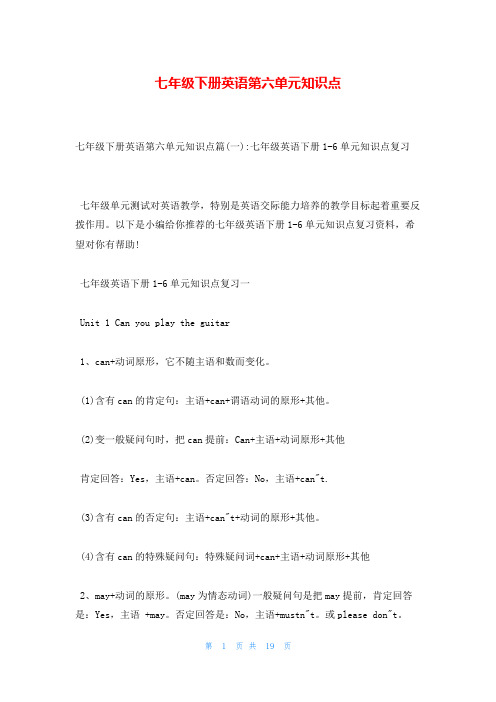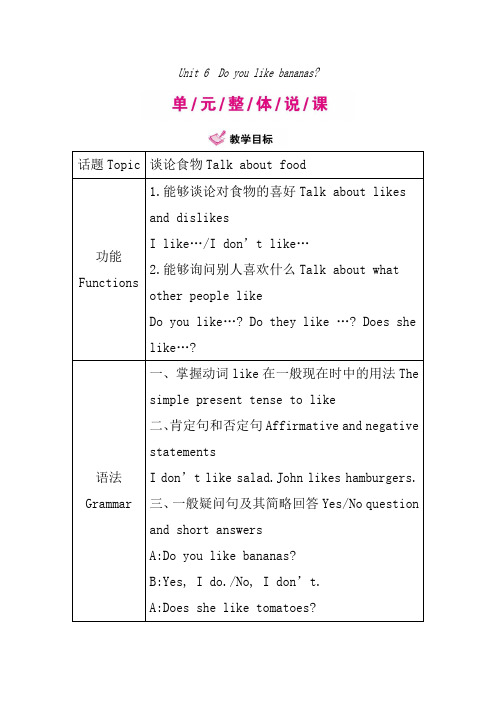七年级英语第六单元第三课时
七年级下册英语第六单元知识点

七年级下册英语第六单元知识点七年级下册英语第六单元知识点篇(一):七年级英语下册1-6单元知识点复习七年级单元测试对英语教学,特别是英语交际能力培养的教学目标起着重要反拨作用。
以下是小编给你推荐的七年级英语下册1-6单元知识点复习资料,希望对你有帮助!七年级英语下册1-6单元知识点复习一Unit 1 Can you play the guitar1、can+动词原形,它不随主语和数而变化。
(1)含有can的肯定句:主语+can+谓语动词的原形+其他。
(2)变一般疑问句时,把can提前:Can+主语+动词原形+其他肯定回答:Yes,主语+can。
否定回答:No,主语+can"t.(3)含有can的否定句:主语+can"t+动词的原形+其他。
(4)含有can的特殊疑问句:特殊疑问词+can+主语+动词原形+其他2、may+动词的原形。
(may为情态动词)一般疑问句是把may提前,肯定回答是:Yes,主语 +may。
否定回答是:No,主语+mustn"t。
或please don"t。
join+某个组织,俱乐部,party,参军,党派等“加入”Join sb. “参加到某人中” join in (doing)sth “加入做......,参加某个活动” Join in=take part in +活动,比赛3、说某种语言:speak+语言4、play+球、棋、牌;play+the+乐器。
5、擅长于(做)什么:be good at +名词/动ing6、帮助某人做某事:help sb. (to ) do sth. help sb. with sth.7、我能知道你名字吗May I know your name8、想要做什么:want to do sth 例如:I want to learn about art.9、What club do you want to joinI want to join the chess club and the basketball club.10、What club does Tom want to join He wants to join the swimming club .11、He can’t play the violin or the piano. Can you help kids with swimming12、Why do you want to join the English club Because I want to learn English well.Unit 2 What time do you go to school1、what time和when引导的特殊疑问句。
精选】人教版七年级下册英语Unit6第六单元优秀教案

精选】人教版七年级下册英语Unit6第六单元优秀教案Unit 6: I'm Watching TVLesson 1: n A (1a-1c)XXX:1.Key Vocabulary: newspaper。
use。
soup。
wash2.Key Phrases: read a newspaper。
using the computer。
making soup3.Key Sentence Structures:What's he doing?He's using the computer.What are they doing?XXX.Focus of Learning:Present Continuous XXXChallenges:1.n of Present Participle (-ing)2.XXX using Present Continuous XXXIndependent Study:1.Preview the new words on page 31 and memorize them。
Translate the following words from Chinese to English: 报纸 (newspaper)使用 (use)汤 (soup)洗 (wash)2.Preview ns 1a。
1b。
and 1c。
Identify the following phrases and sentence structures:read a newspaperusing the computermaking souptalking on the computerWhat's he doing。
He's using the computer.What are they doing。
They are XXX.Classroom Guidance:Step 1: nXXX some students to perform ns in front of the class。
人教版七年级下册英语RJ精品教学课件 Unit 6 第3课时 Section A

Yes, they are. / No, they aren’t. They’re exercising.
She’s exercising (now).
She exercises (on Mondays/ every night/ in the mornings/ etc.).
3 Write sentences following the examples.
house n. 房子
drink v. 喝 n. 饮料
tea n. 茶;茶叶 drink tea 喝茶
tomorrowadv. 在明天 n. 明天;未来
She’s
exercisin g (now). She
Grammar Focus
exWehractisaere you s doi(ngo?n
I’m watching TV.
isn’t sleeping David ______ _________ in his room.
布置作业
adv. 在明天 n. 明天;未 来
_1__ Do you want to go to the movies
n3ow?
_6__ Sure, what time?
take turns doing sth. 轮流做……
3 Take turns miming different activities in your c group. The others in the group guess what the
g Yes, ____ _____.
I am
4. He cleans his room every morning. (用now改写句 子) is cleaning
He ____ _________ his room now. 5. David is sleeping in his room. (改为否定句)
人教版七年级英语上册第六单元教案

Unit 6 Do you like bananas?话题Topic 谈论食物Talk about food功能Functions 1.能够谈论对食物的喜好Talk about likes and dislikesI like…/I don’t like…2.能够询问别人喜欢什么Talk about what other people likeDo you like…? Do they like …? Does she like…?语法Grammar 一、掌握动词like在一般现在时中的用法The simple present tense to like二、肯定句和否定句Affirmative and negative statementsI don’t like salad.John likes hamburgers.三、一般疑问句及其简略回答Yes/No question and short answersA:Do you like bananas?B:Yes, I do./No, I don’t.A:Does she like tomatoes?与方法在日常生活中运用英语的能力。
2.通过图片提供物体的名称,运用实际例子,感知、学习Do you like…? Yes, I do./No, I don’t. Does he like …? Yes, he does./No, he doesn’t.I don’t like…围绕上面的句型展开操练。
通过调查了解学生们喜欢什么、不喜欢什么,然后在此基础上评价自己和他人的生活是否健康。
情感态度与价值观1.通过任务型活动,使学生们在实际生活中均衡饮食,合理配餐。
2.通过开展小组活动,指导学生积极与他人合作,培养他们的合作精神。
Sectio n A 概述1.本单元主要围绕“谈论对食物的喜好”这一交际功能展开,并以like为例,进一步学习实义动词在一般现在时中的用法,是上一个单元内容的2.活动2让学生使用所学语言谈论自己对不同食物、运动类型以及颜色的喜好。
人教版初一下英语七年级第六单元教案

人教版初一下英语七年级第六单元教案人教版出一下英语七年级第6单元教案【教师寄语:Where there is life ,there is hope. 有生命必有希望!】Unit 6 I am watching TV【基础知识】一、语法讲解--现在进行时(一)、定义现在进行时表示现在(说话的瞬间)正在进行或发生的动作。
(二)、用法:A表示现在( 指说话时) 正在发生的事情。
例:We are waiting for you.B. 表示现阶段正在进行的动作,说话时未必正在进行。
例:Mr. Green is writing another novel.C.已经确定或安排好的但不确定会不会发生的将来活动。
I'm leaving for a travel in Nepal next week.(我下周要去尼泊尔旅行) We're flying to Paris tomorrow(我们明天乘飞机去巴黎)(三)、构成现在进行时的构成是:主语+be+v.ing〔现在分词〕形式第一人称单数I+am+V-ing. 第一人称复数We+are+V-ing. 第二人称单(复)数You+are+V-ing. 第三人称单数He(She,It)+is+V-ing. 第三人称复数They+are+V-ing.(四)、句型变化(1)肯定式:be+v-ing She is singing in the next room. (2)否定式:be+not+v-ing The students aren’t cleaning the room. (3)一般问句:be动词提前。
肯定答语Yes,主语+be; 否定答语No,主语+be not。
Are you playing the computer game? Yes, I am. No, I am not. (4)特殊问句:对谓语动词进行提问的:What+be +主语+doing+其他?What is the old man doing under the tree? 对其他成份进行提问的,疑问词+一般疑问句?人教版出一下英语七年级第6单元教案Where is the boy swimming? Who is she waiting for?【及时训练】1、按要求改写句子The boy is playing basketball.否定句:____________________________ 一般疑问句:_________________________肯定回答:__________________________否定回答:__________________________ 对“The boy”提问:__________________________2、把对话补充完整。
七年级英语上册-Module-6-Unit-3《Language-in-use》课件-外研版

Talk show in the classroom on Saturday
What?______________ When? _________ Where? _________
See a film at the cinema on Saturday evening
What?______________ When?_________ Where?__________
温馨提示:“在晚上”用 in the evening, “在夜间” 用at night。
Exercise 一. Match A with B
A 1. 10:00am 2. 3:00pm 3. 7:00pm
B a. in the afternoon b. in the evening c. in the morning
Tom: Hello. Sam: Hello. It’s Friday today. Would you like to go to the cinema tonight ?
Activity 2
Complete the invitations with Would you like or Let`s.
go to the park on Saturday
play computer games on Sunday
1________________
4________________
2________________
5_______________
3________________
6________________
4._o_n_Monday
8._a_t_the park
1 The classrooms are behind the library. _____ are new.
初一英语第六单元教案
初一英语第六单元教案【篇一:七年级英语第六单元课堂教学实录】英语教学实录赵本中学王庆学七年级英语第六单元课堂教学实录一、教学目标1.知识目标:1)能将所学单词进行归类。
2)熟练地掌握主语为第三人称单数和非第三人称的否定句、一般疑问句及其回答。
如:do you /they like salad?yes, i /they do.no, i /they don’tdoes he like french fries? yes, he does. no, he doesn’t.i (they) like oranges. i (they) don’t like bananas.she likes bananas. she doesn’t like ice cream.2.能力目标:能用英语熟练地交流喜欢与不喜欢的食品,并在班上提问同学展开调查。
3.情感目标:通过谈论美食,进一步引导学生享受美味生活,同时培养学生的合作学习精神。
二、教学重点:掌握主语为三单和非三单时的陈述句、否定句、一般疑问句及其回答的形式。
三、教学难点:主语是第三人称单数时的否定句和疑问句中的动词变化形式。
四、教学设计:step 1. 复习前课所学单词与句型:通过看图片说单词的方式复习单词,并通过询问学生“do you like bananas/ oranges??”的形式,复习前一课的句型。
t: yesterday, we learned many words about food, right? do you still remember? now please look at the screen.t: what’s this?ss: apple.t: do you like apples?ss: yes, i do.t: and what’s this?ss: banana.t: yes, what about this one?ss: broccoli.t: do you like broccoli?ss: no, i don’t.t: yes, good job! you have good memory!step 2. 导入新课:分别请一男孩和女孩回答老师的问题,说出他们喜欢与不喜欢的食物,然后就这两位学生的情况向全班提问,以此介绍主语为三单和非三单时的各种句型。
冀教版英语七年级下册Unit 6:Lesson 35 Surfing in Sydney. 教案
Lesson 35 Surfing in Sydney(冀教版Book2)一、教材的地位和作用冀教版七年级英语第二册第六单元是围绕“Seasons in Canada”这个话题展开的,通过讲述加拿大不同的季节,不同的活动,了解自然现象在英语中可能具有的文化含义。
Lesson 47是本单元的第7课时,是通过Aaron对自己喜欢的季节及冲浪的喜爱的介绍来激发学生的学习热情。
二、学情分析从七年级下学期开始,学生已有的知识储备,生活经验和认知水平,再加上他们对英语有着强烈的求知欲和好奇心,以及他们在活动中乐于表现自己的特点。
但是本班学生大多数来自农村,注意到学生英语水平的不均衡,所以通过课堂上一系列的教学活动,激发和培养学生的学习兴趣,鼓励学生大胆实践,勇于探索。
Teaching proceduresBoard design:Lesson 47 Surfing in Sydneypopular exercise bringsurf surfer surfboardlist …as…, ride on the waves课后反思:反思这节课,主要有以下几个特征:一、我在这节课上,把教学目标锁定在对Australian boy 的了解,以此为线索,展开教学活动,从而达到对本单元的复习的目的。
因为一节好的英语课堂应是厚重的,有分量的。
它体现着教师的教学思想,体现着教师对教材的感悟,这并不一定要求每一节课的设计内容有多么繁杂,教学手段有多么先进,而是要凭借教师的自身经验和知识体系,有效引领学生;不被教材所累,根据教学目标,灵活运用教材。
二、师生互动,生生互动,在互动中,碰撞出智慧的火花,在互动中加深师生的情感,在互动中激发学生学习的热情。
在本节课中,通过学生的一环又一环的活动,推动教学的进展,完成了知识的传授。
三、在教师创设的情景中,使学生沉浸其中,在问题的设置中,使学生受到点拨确有收获,使学生得到创新的感受。
新人教版七年级上册英语第六单元精选练习题附答案
新人教版七年级上册英语第六单元精选练习题附答案Unit 6Do you like bananas?第一课时Section A(1a~2d)Ⅰ.根据句意及图片提示填写单词。
(1题图) (2题图) (3题图)(4题图) (5题图)1.Does your brother like ________?2.I don't like ________.But I like oranges.3.I can see a red ________ in the picture.4.My grandpa doesn't like ________.5.Mom,please give (给) me two ________.Ⅱ.根据句意及汉语提示填写单词。
6.The family have ________(正餐) at 6 o'clock in the evening.7.There are seven days in a ________(星期).8.—Is Sally's dictionary in her schoolbag?—Yes,you are ________(正确的).9.Let's think about Alice's ________(生日) party.10.I like ________(蔬菜),but I don't like fruit.Ⅲ.单项选择。
( )11.David has ________ apple and Mike has ________ pear.A.a;a B.an;a C.a;an D.an;an( )12.—What ________ does your sister like?—She likes oranges.A.color B.sport C.number D.fruit( )13.—________your cousin like milk?—Yes,he likes________very much.A.Does;it B.Do;itC.Does;them D.Is;them( )14.John ________ ice-cream,but Jane ________ it.A.like;don't like B.like;doesn't likeC.likes;doesn't like D.likes;don't like( )15.—What do we have for dinner?—________hamburgers and fruit?A.Let's have B.How areC.How about D.What are XⅣ.按要求完成下列句子,每空一词。
人教版七年级英语上册第六单元教学设计(教案)
课题
授课时间
教学目标
教学内容
本单元的核心项目是“喜欢和不喜欢(like and dislike)”。围绕着这一中心项目,课文中设计了各种食物及水果的插图和不同形式的表格,让学生进行听、说、读、写等各种学习活动。通过本单元的教学,使学生学会询问对方与了解别人喜欢与不喜欢的食物,学业会谈论自己与他人早、中、晚餐喜爱吃的食物,为其今后能在交际中恰当地表达自己的情感、灵活运用已经学过的常用功能项目、进一步学习并掌握新的语言功能奠定了坚实的基础。
S3:It’s broccoli.
T:Can we count it”Can we say a broccoli?
S3:Sorry, I don’t know.
2Practice the drill.
T:Work in pairs.Ask and answer with your pictures.
②Practice the drills.
T:Let’s work in pairs .
(Student A looks at Page 33.Student B looks at Page 83.Try to find out what Bob and Bill and don’t like.)
Step3Task.
B关于各种食物的词汇;
C名词复数的使用。
难点:一般现在时中单数第三人称的变化形式。
课时安排
第一课时Section A la–lc
第二课时Section A 2a–4
第三课时Section B la–2c
第四课时Section B3a–4 Self-check
第五课时 Self-check
教学重点
A动词like一般现在时的各种句式及一般疑问句的肯定、否定回答;
- 1、下载文档前请自行甄别文档内容的完整性,平台不提供额外的编辑、内容补充、找答案等附加服务。
- 2、"仅部分预览"的文档,不可在线预览部分如存在完整性等问题,可反馈申请退款(可完整预览的文档不适用该条件!)。
- 3、如文档侵犯您的权益,请联系客服反馈,我们会尽快为您处理(人工客服工作时间:9:00-18:30)。
hamburger 1.没有复数形式 2.前面不加冠词 eggs oranges 3.前面不加数词 apples bananas milk pears carrots bread tomatoes rice vegetables strawberries
eggs, milk, food, fruit, ice-cream, salad, bread, rice, chicken, oranges, apples, bananas, pears, carrots, tomatoes, vegetables, strawberries, Countable nouns
但是约翰喜欢沙拉。 而且,是他的生日。 Bill: But John likes salad, and it’s his birthday. 是,你说得对。 水果呢? Jack: Yes, you’re right. What about the fruit? Tom: I think John likes strawberries and apples. 我想,约翰喜欢草莓和苹果。 Bill: OK. 好吧。那么,让我们吃草莓和苹果吧。then. Let’s have strawberries and apples
3.Lucy喜欢香蕉,但不喜欢桔子。
Lucy likes bananas, but she doesn’t like oranges.
4.我们喜欢汉堡包,但不喜欢鸡肉。 We like hamburgers, but we don’t like chicken.
5.他们喜欢梨子,但不喜欢草莓。 They like pears, but they don’t like strawberries.
Listen and fill in the blanks.
next week Jack: Hey, John’s birthday dinner is ____________. Let’s think about ______________ the food. vegetable salad Tom: Sure. How about burgers,_______________, and some fruit? Sounds good Bill:_______________. John likes hamburgers. Jack: Oh, I don’t like salad. likes Bill: But John ____________salad, and it’s his birthday. Jack: Yes,_____________. What about the fruit? you’re right think Tom: I ________John likes strawberries and apples. Bill: OK. Let’s have strawberries and apples then.
2
1
4
Ask your classmates about the food in the chart. Find out what they like and don’t like. Do you like ice-cream, Liu Li? Yes, I do.
Do you like ice-cream, Zhao Jun? No, I don’t.
Write in like …? Do you groups of four. More than 5 sentences. Yes, I do./ No, I don’t.
Food
likes
doesn’t like
ice-cream rice oranges
milk salad strawberries tomatoes bananas
是的,他们喜欢。不,他们不喜欢。
Does she like tomatoes?
她喜欢西红柿吗?
Yes, she does./No, she doesn’t.
是的,她喜欢。不,她不喜欢。
I like oranges.
我喜欢桔子。
I don’t like bananas.
我不喜欢香蕉。
We like rice.
food fruit ice-cream salad chicken
可数名词复数形式的构成
名词特点 一般情 况下 以-s, -x, sh, -ch,tch等 结尾 的 词尾加 法 加-s 词尾读音方法 例词
1. -s在清辅音后读[s] 2. -s在浊辅音后读[z]
desks apples
加-es
3. -s在元音后读[z] 4. 以音素[ s,z, ʃ,tʃ,dʒ ]结 尾的,读[iz]
那么我们吃些 草莓和苹果吧。
Review(复习):
你说的对。
听起来不错。
an
egg /eg/
eggs rice /rais/ Do you like……? Yes, I do. I like…… No, I don’t. I don’t like……
a carrot /′kæ rət/
carrots
Read together!
Jack: Hey, John’s birthday dinner is next week. Let’s think about the food. Tom: Sure. How about burgers, vegetable salad, and some fruit? Bill: Sounds good. John likes hamburgers. Jack: Oh, I don’t like salad. Bill: But John likes salad, and it’s his birthday. Jack: Yes, you’re right. What about the fruit? Tom: I think John likes strawberries and apples. Bill: OK. Let’s have strawberries and apples then.
5. Burgers? That sounds (sound) good. ________ doesn’t like 6. My brother __________ (not like) eggs. 7. His cousins don’t like (not like) ice-cream. ________ 二、 根据汉语提示写单词。 vegetables 1. Ms Sun likes _________ (蔬菜) very much. dinner 2. We always have ______ (晚饭) at 6:00.
3b
3
Number these sentences [1-4] to make a conversation.
So, let’s get salad. Yes, I do. Do you like salad? OK.
A: Do you like salad? B: Yes, I do. C: So, let’s get salad. D: OK.
我们喜欢米饭。
We don’t like hamburgers.
我们不喜欢汉堡包。
He likes ice-cream.
他喜欢冰激凌。
He doesn’t like vegetables.
他不喜欢蔬菜。
Translate into English:
1.我喜欢水果,但不喜欢蔬菜。 I like fruit, but I don’t like vegetables. 2.我哥哥喜欢面包,但不喜欢沙拉。 My brother likes bread, but he doesn’t like salad.
Liu Li
Zhang Jun
Translate into Chinese:
Do you like salad?
你喜欢沙拉吗?
Yes, I do./No, I don’t.
是的,我喜欢。不,我不喜欢。
Do they like pears?
他们喜欢梨子吗?
Yes, they do./No, they don’t.
I don’t like salad. Let’s have strawberries and apples then. You are right.
John的生日 聚餐就在下 周。
But John likes salad, and it’s his birthday. Let’s think about the food. John’s birthday dinner is next week. What about the fruit? Sounds good.
pears
buses oranges
名词特点
词尾 加法
词尾读音 方法
-ves读[vz]
例词
以 f 或 fe 结 改 f 或 fe 为 v 再加 尾的 -es 以辅音字母 +y结尾的
knife- knives wife-wives
ies
改y为i 再 加-es
加-es
-ies读[iz]
4. We (likes / like) hamburgers, but we (don’t / doesn’t)
like chicken. 5. They (likes / like) pears, but they (don’t / doesn’t) like strawberries.
第三人称复数形式
families
-es读[z] tomatoes negroes potatoes heroes photos radios
